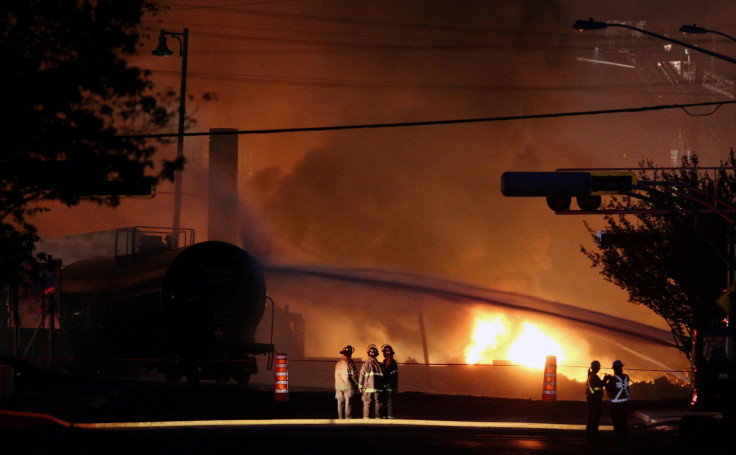Lac-Mégantic Train Crash Death Toll Increased To 50

Canadian police announced on Wednesday that at least 30 people missing in the wreckage of a fiery Quebec train crash have officially been presumed dead. The Associated Press reports that 20 bodies have been recovered from the crash’s wreckage, bringing the total number of presumed dead up to 50. That makes the Lac-Mégantic crash the deadliest Canadian accident since the Swissair disaster of 1998.
The driverless oil tanker derailed in Lac-Mégantic around 1 a.m. Saturday morning and exploded, killing more than 50 people and destroying dozens of buildings in the center of the town near the Maine border. Fires blazed at the scene of the crash for well over 24 hours, hampering efforts to rescue possible survivors. Investigators at the scene found that the train’s air breaks had failed, leading the train to rush downhill before derailing and exploding in downtown Lac-Mégantic.
In the aftermath of the fire, Edward Burkhardt, CEO of the rail line’s parent company, Rail World Inc., singled out the train’s engineer as likely being responsible for the crash. Burkhardt claims that the engineer, who has not been officially named, failed to properly set the train’s brakes when parking it uphill hours before the crash and explosion. The engineer has since been suspended without pay and is under “police control.”
"He's not in jail, but police have talked about prosecuting him," Burkhardt told the Associated Press. "I understand exactly why the police are considering criminal charges ... If that's the case, let the chips fall where they may."
The BBC reports that Canadian police have also determined that a small fire aboard the train may have led to its brake failure and ultimate explosion. Police are looking into that fire as a possible criminal act. Based on the train’s black box information and eyewitness interviews, the Canadian Transportation Safety Board has assembled a timeline of the night.
Around 11 p.m. Friday, the train’s engineer and crew brought the train into its destination for the night at nearby Nantes, Quebec, and locked the train in place on an uphill slope. About 50 minutes later, a small fire started on one of the train’s locomotives, and the fire department appeared shortly thereafter to extinguish it. Then, around 12:50 a.m., the brakes apparently failed, sending the train on a high-speed, 18-minute journey downhill. After picking up considerable speed, the train derailed inside Lac-Mégantic’s city center, and the 72 cars of crude oil inside the train exploded, killing at least 50 people in the resulting devestation.
Wednesday’s increased death toll makes the Lac-Mégantic explosion the deadliest accident in Canada since a Swissair jet crashed into the sea off Nova Scotia in 1998, killing 229 people.
© Copyright IBTimes 2024. All rights reserved.






















